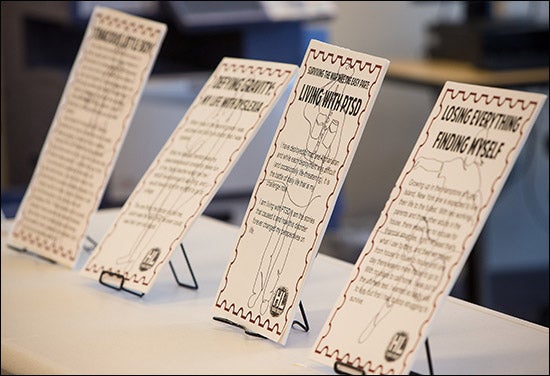AVID READERS
'Human books’ share their life stories at ECU
East Carolina University library patrons checked out more than printed works on March 4 at Joyner Library. At a Human Library presentation, readers borrowed “human books” for 15-minute conversations about unique life experiences.
Event planners hoped the experience would help break stereotypes and create an open dialogue about inclusion on campus, said Katy Kavanagh Webb, interim head of research and instructional services at Joyner. She said she enjoyed multiple discussions on topics such as surviving cancer, sexual abuse, homelessness, culture shock and HIV.
Video by Cliff Hollis
“I got a chance to connect … and it helped me see each individual has these awesome background experiences to draw off of,” she said.
Student volunteer Emily Bosak, who has dyslexia, served as a human book volunteer sharing the experience of living with a learning disability. “My whole life people thought I was stupid,” she said.
“It’s cool to…tell people that even though I have dyslexia, I’m not stupid.”
ECU junior James Reardon shared his life experiences as a veteran living with post-traumatic stress disorder.“We’re portrayed in TV shows as ticking time bombs and that’s just not the case,” he said. “I want people to know we’re just soldiers who went to war and came home with a different kind of wound.”

Volunteer Tiyuana James-Hinton participates in discussion as one of Joyner Library’s human books.
For some the learning experience at the Human Library moved beyond simply gaining new perspectives. College of Nursing professor Robin Corbett said she encouraged her students to attend because it was an innovative way to learn how to interview potential patients. The experience provided a unique opportunity for nursing students to learn how to gain essential information to help them better care for patients, she said.
Approximately 75 visitors attended the Human Library event, where they could first browse the titles of the available human books and read a synopsis before deciding if they wanted to learn more about the person’s story.
The human book categories and individual stories represented were:
Health:HIV, Cancer Survivor, Multiple Sclerosis, Vitiligo
Psychology: PTSD, Dyslexia, Sexual Abuse
Religion: Judaism, Atheism, Christianity, Islam
Social Sciences: Homelessness, LGBT, Transgender, First Generation College Student, Poverty, Non-Traditional Student
Cultural: Native American, Study Abroad, Culture Shock, Living in the Middle East, Two Cultures
Careers: Social Worker, Soldier, Educator, Program Coordinator
Book titles and brief descriptions helped patrons select which human books they wanted to ‘borrow’ for a 15-minute conversation.
